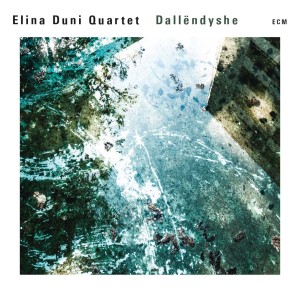 The Elina Duni Quartet returns with its second outing on ECM, asumptuous and stirring follow-up to 2012’s Matanë Malit. ComprisingAlbanian-born, Swiss-raised singer Duni, Colin Vallon on piano, Patrice Moret, bass, and Norbert Pfammater, drums, the quartet has raised to a sublime art the blending of Balkan folk music and contemporary jazz.
The Elina Duni Quartet returns with its second outing on ECM, asumptuous and stirring follow-up to 2012’s Matanë Malit. ComprisingAlbanian-born, Swiss-raised singer Duni, Colin Vallon on piano, Patrice Moret, bass, and Norbert Pfammater, drums, the quartet has raised to a sublime art the blending of Balkan folk music and contemporary jazz.
Dallëndyshe consists mostly of traditional Albanian songs reimagined as haunting modal jazz pieces. The theme of the album is exile, although musically the songs range from somber and elegiac to airy and light, to joyously rhythmic. As Duni explains in the album’s press release, “One of the fascinating things about music of the Balkans, in a lot of the folk music, is the idea that the pain has to be sung. And in singing you go beyond it. That’s what the blues is about, of course, and you find a similar sensibility in these Albanian songs about exile and lost love. In some Balkan music, you dance away the pain – and songs that seem at first to be joyful, from the rhythms and the melody, turn out to be not at all joyful when you listen more closely. This is a characteristic quality in music of the region.”
Duni sings in a soprano that is somehow wonderfully clear and deeply shaded at the same time, with the kind of control that’s necessary in these Balkan songs with their quarter-tones and subtle grace-notes. The album opens and closes on particularly somber notes with two songs that use different birds as metaphors: “Fëllënza” or The Partridge is a deeply dreamlike song of frustrated love appropriating the titular bird’s symbolism of deception and temptation. It comes off like an art song, for the most part consisting of just piano and voice, Vallon’s half-note chords and stray melodic notes emphasizing Duni’s fluid reading. In the instrumental bridge and again in the lightly frenetic outro (nothing this quartet does is heavy-handed), the players up the tempo and the dynamics, and Duni’s vocal scatting becomes the fourth instrument.
The album ends on the title song named for the swallow, which in all of Europe is symbolic of spring and resurrection. This, however, is a dirge-like song of mourning for exile and loss of home, based on the plight of southern Albanians known as the Arbëresh who fled to Italy in the 19th century. “Oh, swallow born again,” Duni sings, “when you come back to return, when you make it to Korona you’ll no longer find our homes.”
Many of the songs reflect the mourning of women left behind by husbands and lovers who fled into exile, including one contemporary song, “Sytë,” The Eyes. The music is tightly wound like the emotions of the narrator who can’t sleep as she cries for her lover, who doesn’t come around any more. It has the quality of a fevered dream, particularly in light of the final section in which Duni scats along with the rushing piano melody. This clever animated video uses, again, avian imagery to tell the dreamlike story:
In one of the saddest songs, “Nënë Moj,” O Mother, a young bride is crying to her mother for marrying her off to someone in a distant place. It’s a different kind of exile, a traditional one reserved for women. In one of my favorites, “Unë Do Të Vete,” there’s a disconnect between the tune and the rhythm, Duni’s vocals floating over the music like a shimmering mirage. She carries the sing-song melody, which is like a children’s song in an odd meter, every other line repeating “lule moj lule” or “flower, my flower.” But the accompaniment is mostly portentous whole notes by all three musicians – supremely effective. “Bukuroshe,” Beautiful Girl, is a fast dance in 12 beats, a love song to a beautiful girl that ends with a proposal. It’s a short, quick song and it sounds every bit the folk dance until the verses are finished and the jazz improvization begins. One of the most interesting is another upbeat track, the penultimate “Ti ri ti ti Klarinatë” about how the clarinet player entices the girls to come out. With pounding tempo and thrilling dissonance, it’s a song of the Arvanites, an Albanian expat population long living in Greece, sung by Duni as almost a soul jazz piece crossed with a Greek dance.
A lot of musicians in the Balkans and in the diaspora in America blend jazz and folk dance music in various and exciting ways. Elina Duni Quartet with Dallëndyshe ups the ante. I’m pretty sure I won’t hear a more beautiful album this year.
(ECM, 2015)
